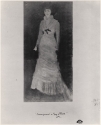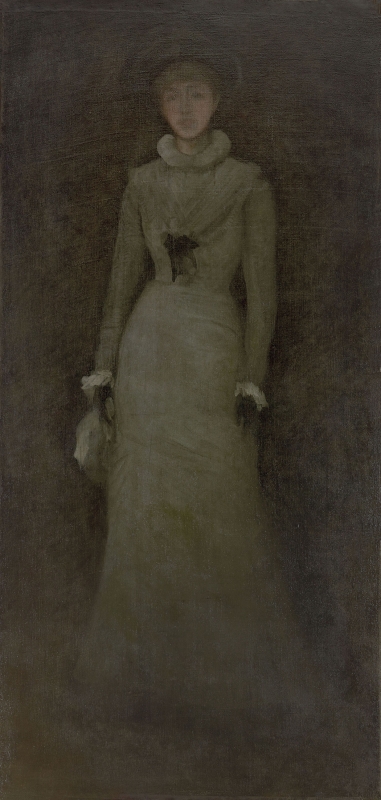Composition

'Arrangement in Grey and Black, No. 2', photograph signed ca 1881, Baltimore Museum of Art, 33.53.9055
The proportions of the photograph of a portrait of Maud Franklin reproduced above (22.3 x 10.0 cm) correspond to those of the oil Portrait of Miss Florence Leyland [YMSM 107]: the grain of the canvas shown in the photograph also confirms the identification. 1
In November 1878, during the Whistler v. Ruskin trial, Whistler stated that he had 'painted over' the portrait exhibited as 'Harmony in Amber and Black' (that is, the painting underneath the portrait of Florence Leyland), 'with a view to alter it and change its character as a picture. It is in a transition state.' 2
It seems possible that Whistler completely abandoned one portrait of Florence Leyland (one probably painted at some time between 1874 and 1876), and, after his quarrel with Leyland, altered the features of a portrait of Maud Franklin to make it resemble Florence Leyland. He also changed certain details: the black ribbon became larger, and a row of ruching was added to the collar, the ruff became smaller, the hat much smaller and perched on top of her head, and the young woman held a white handkerchief.
Furthermore, in its present form, Portrait of Miss Florence Leyland [YMSM 107] shows almost exactly the same pose as a portrait of Millie Finch (fl. 1875-1885), Harmony in Coral and Blue: Miss Finch [YMSM 237], and it is possible that, since she was also posing for Whistler in the early 1880s, the two compositions were related.
Technique
Painted thinly on medium coarse canvas, showing signs of rubbing down: it is very dark indeed.
Conservation History
It has obviously been rubbed down, probably by the artist, and possibly by others, and has also darkened over the years. Charles Lang Freer (1856-1919) saw it on exhibition at the Metropolitan Museum in 1910 and wrote to Rosalind Birnie Philip (1873-1958) that it was in poor condition. 3 In 1911 the Pennells described it as 'the very unfinished and unsatisfactory commencement of Florence Leyland.' 4
Frame
It was in an 18th century type frame in the 1970s.
Last updated: 30th December 2020 by Margaret










